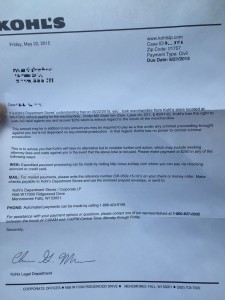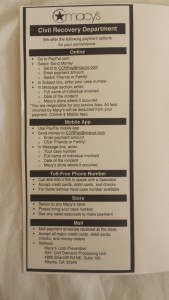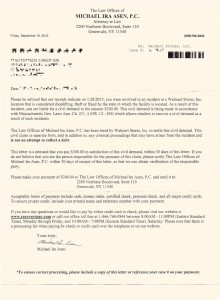Retailers are increasingly aggressive in sending out “civil relief”, “civil recovery” or “civil demand” letters to anyone they accuse of or catch shoplifting in their stores. The bigger chains send out these threatening letters all the time, either from their own loss prevention departments or via outside law firms to whom they outsource these collection efforts.

These letters are aggressive, scary, and threatening. Often if you ignore the first letter, they will send you increasingly insistent letters, and quite likely increase the amount of the civil relief they want you to pay.
I tell my clients not to pay them, and I’ll go through the reasons why in a moment. You can ignore these letters, or if you hire us to represent you on a criminal charge, we can write them a letter on your behalf telling them to stop bothering you.
But the whole thing is basically a scam. It won’t help you with your charge, and may very likely make things worse for you. These letters are a profit center for the retail giants, their lawyers, and collectors. They are, quite simply, preying upon frightened people who may have made a dumb mistake.
Here are the reasons why you should not comply with their threats.

1) The store almost certainly won’t sue you, even though they claim they will.
Yes, the words are threatening. While it is theoretically possible for them to sue you in civil court for attorney fees and costs against you, practically speaking that (almost) never happens. Some retailers, like Lord & Taylor have explicitly said in legal depositions that their internal policy is never to follow up in civil court. They are literally just trying to get you to pay them money without a fight.
2) It could make it MORE likely that you face a criminal conviction.
If your case isn’t settled yet, prosecutors could decide to use the fact that you paid off the store you are accused of stealing from if they found out.
Paying the civil recovery voluntarily isn’t exactly like confessing, but it could be interpreted that way if it gets to court. You don’t want a criminal conviction if you can possibly avoid it. And most of the time we can stop that from happening in court. Even when you know you are guilty.
3) You could damage your future job opportunities.
Paying the civil request will put you in a private database run by a consortium of the biggest retailers and employers in the country. It’s called the National Retail Theft Database, run by the National Retail Mutual Association.
Even if you are sure you will never be looking for a retail job, you never know where this information could end up. It is an unregulated database of giant companies.
You might be looking for a management job at one of these companies someday. Or they could share or sell this data to a 3rd party background check service. There is no way of knowing what could happen.
4) It is just wrong. And some Massachusetts judges are starting to get the message and are looking to fight back.
I had a case recently at a Clerk Magistrate’s hearing in the Pittsfield District Court with a client who was accused of shoplifting.
Not only did we win the case, and the criminal charge was completely dropped, but the Magistrate specifically told my client “don’t pay that civil recovery request from the store!”
Also, there was a recent case in the news from the Natick District Court where Judge Stoddart accused Macys in Natick of being “ethically wrong” in pursuing these kinds of penalties. He has issued injunctions to try to prevent them from doing so. Macy’s tries to demand $500 from alleged shoplifters.
While the injunction from the judge is unlikely to work, since it is completely legal for retailers to do this, more and more publicity may ultimately bring pressure to change the civil relief opportunities available to the retail giants.
I got a letter from a law firm (Law Offices of Michael Ira Asen) demanding money. Should I pay it?
I know it looks really official and scary. But it is still basically a scam. Even though what they are doing is “legal”,
Walmart is the biggest retailer in the world, but outsources their shoplifting civil demand letters to the firm of The Law Offices of Michael Ira Asen, PC in Greenvale, NY. Other retailers like Lord & Taylor also use the Asen law offices. They send in on heavy legal stock paper, and it feels very authoritative and serious.
Why do they outsource to this law firm instead of doing it in-house like Kohls and other places? Because it works better. I guarantee they tested it and ran the numbers because they are Walmart, that’s what they do – they squeeze profits in every conceivable way.
And they decided that a letter from a law firm makes people more likely to pay and makes them more money then if they simply send a letter from Walmart headquarters in Bentonville, Arkansas. The law firm front undoubtedly collects a higher percentage than they would otherwise, so Walmart gets a bigger cut.
They make it seems as if it is just a small, sleepy law firm with a friendly older woman behind the reception desk, slowly and precisely typing out these letters with her arthritic wrists. In fact, there is probably an assembly line of minimum wage workers processing these requests in an anonymous office warehouse.
We get calls like this all the time, even from people who have already dealt with the criminal charge:
I was arrested for shoplifting and dealt with the criminal charge. I did my community service. I have received 3 letters from the law offices of Michael Ira Asen demanding $500. I was told to ignore it but Im nervous now.
This is awful, but happens every day. These threats after the fact should be illegal. Don’t give in.
Trust me when I say that a law firm on Long Island New York isn’t going to come to Massachusetts to sue you in court for a $300 or $500 claim. In fact, the initial letter doesn’t even include a threat, it just says “you are liable for a civil demand in the amount of $300”. There is no other explicit threat, they just want you to dutifully and fearfully enter your credit card at their claim recovery site of www.recoverypay.com. And they’ll charge you a processing fee, too, “when paying by check or credit card over the telephone or on our website”. I guess if you show up and pay in case, there is no fee? (Someone should try this in pennies!)
Here is our response letter we send on behalf of clients to the Law Offices of Michael Ira Asen:
Macy’s Gave Me a Civil Demand Notice on the Spot Immediately After they Caught Me

Yes, they are very aggressive. Their notice says they want the money within 5 days to avoid sending a notice to your home. If you live with someone who you wouldn’t want to see a suspicious envelope from the Macy’s Loss Prevention Department, that could be quite threatening. And they still leave their options open, of course, saying
“This civil demand fee is totally separate from any criminal punishment or penalties that may be imposed by any court arising from this incident. Failure to settle this demand may result in a lawsuit being filed against you in the full amount of your claim, plus additional court costs and attorney’s fees.”
So, this payment is totally separate from any possible criminal charge, and if you don’t pay it, we might sue you also. Gee thanks, Macy’s!
If that isn’t bad enough, the instructions for sending the payment via paypal online tell you to select the payments to”friends and family” option. (see image to the right)
Friends and family?!? Yes, because if you are paying friends or family, the recipient doesn’t have to pay a merchant fee to receive the money. They want to be your “friend” after threatening you and extorting you for $250 bucks, and they won’t even give Paypal a service fee to do it.
Everything is about making a buck with these operations.
A police officer told me if I don’t pay the civil shoplifting relief letter, I’ll be charged with a crime.
This is a lie, plain and simple. He is scaring you, and being a bully. In actuality, he will have no idea if you pay it or not, and it will never you from getting a criminal citation.
I have found that cops are often very unsympathetic, mean, and judgemental to any accused of shoplifting.
But I really actually did shoplift. I made a mistake and feel terribly guilty. Aren’t they right? Shouldn’t I pay?
No. They are taking advantage of the fact that you are a good person and feel guilty. They are threatening you and making you afraid. That is wrong.
If you made a mistake, you made a mistake. We get calls all the time from people who made a poor decision they immediately regretted. Whether it was a moment of poor impulse control (often from people on anti-anxiety drugs or anti-depressants) or a result of a desperate situation, it’s ok.
We all make mistakes. You shouldn’t be over-punished for them. In most cases, the stores didn’t lose anything.
Fortunately, the Massachusetts court system has a number of ways to give you a second chance, and avoid a permanent criminal record for a minor shoplifting charge.
I wrote an entire book on the Clerk Magistrate’s hearing process, where clerks have the opportunity and the discretion to give someone a second chance to avoid a serious, life changing legal penalty and conviction.
These hearings exist under Massachusetts law for a reason. Just because greedy retailers think they can threaten you into paying them, when, with the right argument and circumstances, the Commonwealth is often willing to cut you a break.
How did these retailers get so powerful and sneaky about going after shoplifters?
It’s a story that is as awful as it is unsurprising. The whole thing is laid out in a story in the Wall Street Journal from a few years back.
Basically, the corporate retailers smelled a buck and got together to lobby all 50 states to pass laws allowing civil recovery actions. It was just that easy for corporate America to try to turn “loss prevention” into a profit center. So it is now practically effortless for them to intimidate accused alleged shoplifters into coughing up a few hundred bucks.
And there are 3rd party companies that profit from this. There is a company that helps retailers issue demand letters immediately.
It also has a built in prior offence checking system. CDA will then calculate the proper civil demand, generate a CUSTOM demand notice and send the document back to the user, ready-to-print. Reduced case transmission time will give CDA the added advantage of increasing the commitment to reimburse your organization for any incurred losses.
If you are accused of a shoplifting or larceny charge in Massachusetts, please call or text us. We can absolutely help you try to avoid a criminal charge and have an excellent record of success in winning these cases.

